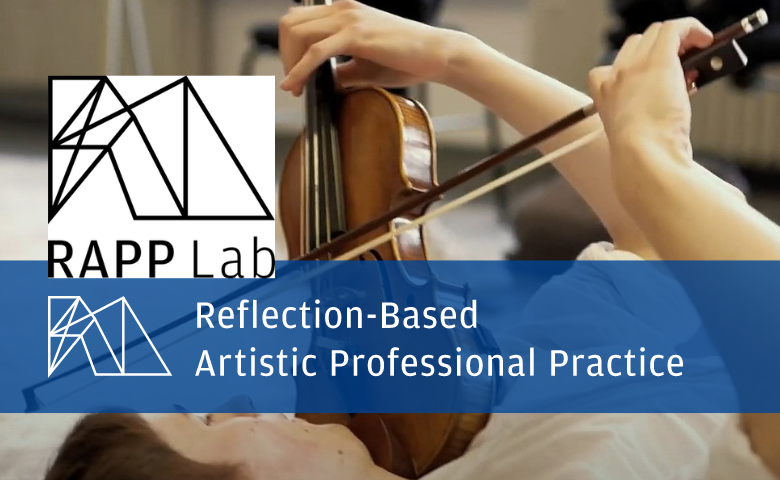Online Event: 17 November 2022, 17:30-19:30 (CET)
“Make the (Un)Familiar (Un)Familiar. A Kaleidoscope of Reflection in Artistic Practices”
In artistic research, the word “reflection” is booming, and its meanings range widely: from spoken and discursive analysis before or after an artistic performance to improvisation as sonic reflection in the artistic activity itself. The RAPP Lab project playfully investigates the qualities, and often slippery properties of “reflection” as being vague, concrete, unvoiced or embodied and creates six experimental settings (Labs) in which students can expand and specify their reflective skills. We invite the artistic research community to switch the perspective from “What is reflection?” to “In which learning and teaching parameters and conditions can reflection and critical thinking in artistic research emerge?”
This digital event will focus on the three Labs which have taken place during the year 2022: Lab 3 (May 2022) at the HfMT Cologne on Embodied Reflection, Lab 4 (June 2022) contributed by mdw Vienna on Transculturality, and Lab 5 (September 2022) by the Estonian Academy of Music and Theatre in Tallinn on Autoethnography. It will present a kaleidoscope of methodological perspectives of artistic research between these three learning environments.
Coordination: Hochschule for Music and Dance Cologne (Dr Sybille Fraquelli)
Artistic Direction: Dr Evelyn Buyken
Please click here to find the official invitation here.
RAPP stands for “Reflection-based Artistic Professional Practice” and brings together the artistic research expertise of seven partner institutions in Europe. During a series of multi-national, experimental, thematically and methodologically differentiated encounters, described as Labs, advanced music students have the opportunity to try out new teaching and learning formats. RAPP Lab is a three-year EU-funded research project supported by the ERASMUS+ programme “Strategic Partnerships”.
RAPP Lab explores how the reflective methodologies of artistic research empower musicians to creatively respond to the economic-cultural environment with which they are confronted. The project brings together the artistic research expertise of seven partner institutions in six different European states: Association Européenne des Conservatoires – AEC, Bruxelles, Belgium; Conservatorio di Musica Santa Cecilia, Rome, Italy; Eesti Muusika-ja Teatriakadeemia, Tallinn, Estonia; Hochschule für Musik und Tanz, Cologne, Germany (as Coordinator); mdw – Universität für Musik und Darstellende Kunst, Vienna, Austria; Norges musikhøgskole, NMH, Oslo, Norway; Orpheus Instituut Ghent, Belgium.






